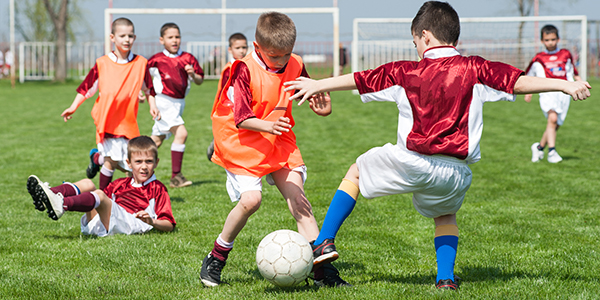
How to Deal With Pre-Game Jitters
Many young athletes feel nervous or anxious before they compete. Some athletes may feel their heart beating rapidly and sense tension in their muscles. They may worry about their performance. Young athletes aren’t the only ones who experience pre-game jitters. Professional athletes even feel nervous or anxious before they perform.
Pre-game jitters take two forms — positive or negative. If athletes interpret their physical signs (rapid heart rate, sweaty palms, feeling butterflies in the stomach) as helping them feel full of energy and ready to compete, they are positive jitters. By interpreting these physical signs as helpful to their performance, they will perform better and have more fun.
Pregame jitters have an negative impact on athletes when they interpret these physical signs as “I’m nervous.” In this case, athletes can perform badly if the jitters don’t disappear within the first few minutes of the game. Athletes who experience negative pregame jitters are more focused on their bodies and their nerves. They may question why their heart is beating so fast. When this happens, athletes are not focused on the game.
Parents can help their sports kids with negative pre-game jitters.
- Be conscious of your own anxiety or nervousness. Many parents feel anxious when they watch their young athletes perform. Some parents may get up and walk around or tap their feet nervously during the game. Parents can start by recognizing how their own nervousness can affect their athletes’ feelings and performance.
- Help sports kids determine when pre-game jitters are helpful to their performance. Young athletes need to be aware of their pre-game jitters before they can try to use them to their advantage. Parents can ask their athletes to compare their good and bad performances. Kids can then determine how they felt before and during competition and how that affected their performance.
- Focus on the process more than the outcome. Kids may feel pressure to win, which may lead to negative jitters. Parents can emphasize effort or improvement. For example, a parent may say, “Nice job on defense today,” no matter how the team’s overall performance was.
- Understand what motivates your young athletes. Some kids may play sports to please a parent. Some parents may push their kids into sports to relive their own sport experiences. Kids may feel added pressure to do well in sports to make a parent proud.
Many young athletes experience jitters before competition. Parents may be influencing these jitters. You want to make sure that your kids interpret jitters as helpful to their performance.
Related Sports Psychology Articles
- How Choking Hurts Athletes’ Performance
- Helping Young Athletes Overcome Pregame Anxiety
- Assessing Your Child’s “Mental Game”
*Subscribe to The Ultimate Sports Parent Podcast
*Subscribe to Peak Performance Sports on Youtube
Download a free sports psychology report to improve your mental game!
The Confident Sports Kid

When kids lack confidence, they doubt themselves, stop taking risks, play tentatively, and are hard on themselves. As a result, kids often lose their motivation to improve. Ultimately, these barriers keep them from enjoying sports and making the most of their physical talent.
“The Confident Sports Kid” program is actually two programs: one that teaches sports parents how to boost their kids’ confidence, and another that teaches young athletes age 8 to 18 how to improve their self talk, avoid negative thinking, overcome expectations that limit confidence, and much more. The program will help kids boost their confidence in sports and life…and enjoy sports more.
